Abductions of Japanese Citizens by North Korea
Abductions of Japanese Citizens by North Korea
 1.Abductions of Japanese Citizens by North Korea
1.Abductions of Japanese Citizens by North Korea
The authorities' investigations into missing Japanese citizens cases and the testimonies of defecting North Korean agents have revealed several strongly suspected cases of abductions by North Korea. Therefore, since 1991, the Government of Japan (GoJ) has raised the abductions issue at every possible opportunity. North Korea had stubbornly kept denying any involvement. However, at the First Japan-North Korea Summit Meeting held in September 2002, North Korea at last admitted for the first time that it had abducted Japanese citizens and apologized while promising to prevent any further recurrence. In October of the same year, five of the abductees returned from North Korea to Japan after 24 years.
However, as for those others whose whereabouts are currently unknown, despite North Korea's explicit commitment at the Second Japan-North Korea Summit Meeting in May 2004 to immediately resume thorough investigations to obtain a full account of what had happened to all abductees, North Korea has yet to provide any convincing explanations. Furthermore, the GoJ has repeatedly requested the provision of relevant information on cases in which the possibility of abduction by North Korea cannot be ruled out (Note 1), including so-called “unidentified missing Japanese probably related to North Korea” (Note 2). The remaining abductees are still denied all freedoms, having been long detained in North Korea, and to this day await rescue from North Korea.
In Japan, there have been active campaigns to rescue abductees, including the Association of the Families of Victims Kidnapped by North Korea formed in 1997, and the submission of petitions signed by more than 17.22 million people (as of January 2024) to the Prime Minister of Japan.
The abductions by North Korea are a critical issue concerning the sovereignty of Japan and the lives and safety of Japanese citizens. It is a highly pressing issue that must be resolved under the responsibility of the GoJ. The GoJ has so far identified 17 Japanese citizens, including the five that have already returned to Japan, as victims of abduction by North Korea. In addition, there are other cases in which the possibility of abduction by North Korea cannot be ruled out, such as the suspected abductions of non-Japanese nationals referred to as “Korean domiciles” (an alternative nationality for ethnic Koreans in Japan who do not hold Republic of Korea (ROK) citizenship) in Japan and cases of so-called “unidentified missing Japanese probably related to North Korea”. While North Korea has not provided any satisfactory account or any convincing evidence, the GoJ remains fully committed to demanding North Korea take action to ensure the safety of all abductees and their immediate return to Japan regardless of whether they are officially identified as abductees, based on the premise that all abductees whose fate is unknown are still alive. The GoJ also remains committed to pursuing the disclosure of the truth regarding all abductions and demanding the surrender of the perpetrators of the abductions to Japan. The GoJ will, in accordance with the Japan-DPRK (the Democratic People’s Republic of Korea) Pyongyang Declaration, continue to make its utmost efforts to realize the normalization of its relations with North Korea, through realizing the return of all abductees as soon as possible and settling the unfortunate past.
(Note 1) For missing persons cases in which the possibility of abduction by North Korea cannot be ruled out, the time of occurrence is even more extensive.
(Note 2) The term “unidentified missing Japanese probably related to North Korea” is used by the private citizens’ group, the Investigation Commission on Missing Japanese Probably Related to North Korea, to refer to all missing Japanese it investigates.
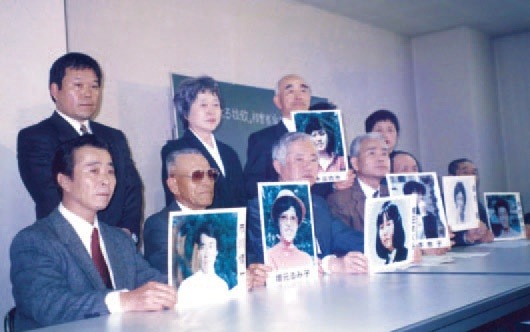
The Formation of the Association of Families of Victims Kidnapped by North Korea
 2.Talks between Japan and North Korea on the Abductions Issue
2.Talks between Japan and North Korea on the Abductions Issue
1. First Japan-North Korea Summit Meeting (September 2002)
At the first Japan-North Korea Summit Meeting held on September 17, 2002, Kim Jong-Il, then Chairman of the National Defense Commission of North Korea, admitted, after years of denial, that the abductions of Japanese citizens took place and apologized. He also stated that among 13 persons who were suspected by the GoJ at the time to have been abducted by North Korea, four were alive, eight were dead and for one, entry into North Korea was not confirmed (Note). In addition, he acknowledged the abduction of SOGA Hitomi, who wasn’t on the list for the investigation requested by the GoJ, and confirmed that she was alive. On the other hand, he claimed that as a result of a subsequent investigation, SOGA Miyoshi, SOGA Hitomi’s mother who had disappeared at the same time, had not entered North Korea. Moreover, while promising to punish those responsible and prevent any recurrence, Kim assured that he would facilitate meetings between the abductees and their families as well as their return to Japan.
In response, then Prime Minister Koizumi Junichiro strongly protested to Kim Jong-Il, then Chairman of the National Defense Commission, and demanded the continuation of an investigation, the return of those alive, and the prevention of any recurrence.
(Note) North Korea confirmed that four abductees, CHIMURA Yasushi and Fukie and HASUIKE Kaoru and Yukiko, were still alive, where it reported that eight abductees, YOKOTA Megumi, TAGUCHI Yaeko, ICHIKAWA Shuichi, MASUMOTO Rumiko, ISHIOKA Toru, MATSUKI Kaoru, HARA Tadaaki, and ARIMOTO Keiko, were dead, and that KUME Yutaka had never entered its borders. Note that the GoJ officially identified SOGA Miyoshi in January 2003, TANAKA Minoru in April 2005, and MATSUMOTO Kyoko in November 2006 as abductees.

The First Japan-North Korea Summit Meeting
2. Dispatch of the Investigation Team of the GoJ (September and October 2002)
From September 28 to October 1, 2002, the GoJ dispatched an investigation team that met with victims and strived to collect information on abductees who have not yet been accounted for. Unfortunately, the information provided by North Korea was limited right from the start and inconsistent and dubious on many points. For example, North Korea handed over materials it claimed were the remains of MATSUKI Kaoru, but forensic analyses showed that these remains were those of someone else. At the 12th round of the negotiations to normalize diplomatic relations between Japan and North Korea held from October 29 to 30, 2002 in Kuala Lumpur, Malaysia, the GoJ posed 150 questions concerning inconsistencies in the information provided by North Korea and requested more information, but did not receive an adequate response from North Korea.
3. The Return of Five Abductees (October 2002)
On October 15, 2002, five abductees (CHIMURA Yasushi and Fukie, HASUIKE Kaoru and Yukiko, and SOGA Hitomi) returned to Japan and were finally reunited with their families.
With the consideration that the five abductees returned to Japan should be provided with an environment in which they were free to determine their own future and the future of their families who were still in North Korea, on October 24, 2002, the GoJ announced that the five abductees will remain in Japan. The Government also strongly urged North Korea to ensure the safety of their family members still in North Korea and to promptly set a date for their return to Japan.
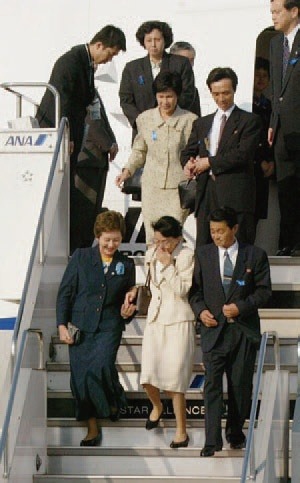
The abductees returned to Japan after 24 years
4. Second Japan-North Korea Summit Meeting (May 2004)
On May 22, 2004, then Prime Minister Koizumi visited North Korea for the second time and was engaged in discussions with Kim Jong-Il, then
Chairman of the National Defense Commission, concerning the abductions and other bilateral issues, as well as security issues such as North
Korea’s nuclear and missile programs. Regarding the abductions issue, the two leaders agreed to the
following points during their meeting:
● North Korea agrees to allow all five family members of CHIMURA Yasushi and Fukie, and of HASUIKE Kaoru and Yukiko to return to Japan on the day of
the Summit Meeting.
●North Korea would promptly resume investigations from scratch in order to provide a full account of the truth.
Based on this agreement, all five members of the families of CHIMURA Yasushi and Fukie and of HASUIKE Kaoru and Yukiko returned to Japan with then Prime Minister Koizumi. Three family members of SOGA Hitomi subsequently arrived in Japan on July 18, 2004.
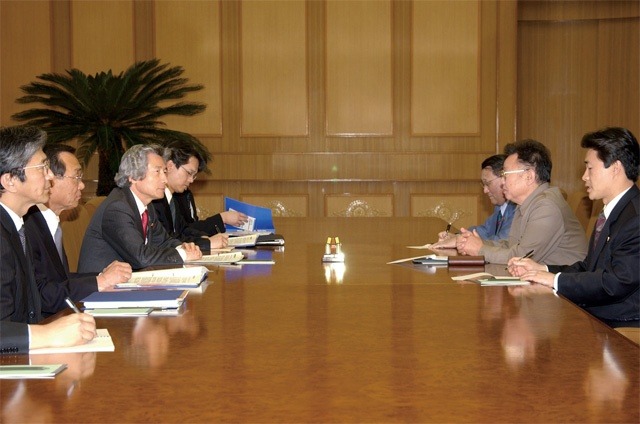
The Second Japan-North Korea Summit Meeting
5. Japan-North Korea Working-Level Consultations (August and September in Beijing; November in Pyongyang in 2004)
(a) The Japan-North Korea Working-Level Consultations were held in Beijing in August (1st round) and September (2nd round) 2004. North Korea presented the preliminary results of its ongoing investigations into the abductees whose whereabouts remain unknown, but no concrete evidence or documentation to support the presented information was provided.
(b) The third Japan-North Korea Working-Level Consultations took place in November of the same year. They lasted for more than 50 hours and included a question-and-answer session with the
Investigation Committee of North Korea, along with direct interviews with a total of 16 alleged witnesses and the onsite inspection of facilities and other locations related to the abductions.
Evidentiary materials such as the remains that North Korea claimed to be those of YOKOTA Megumi were also collected.
Moreover, at these Consultations, Japan requested that North Korea provide relevant information
on five of the missing people whom the GoJ has not identified as abductees, but who might have
been abducted by North Korea (“unidentified missing Japanese probably related to North Korea”).
The North Korean side, however, responded that their entry into North Korea was not confirmed.
(The GoJ repeatedly requests at consultations and during any other opportunity that North Korea
provides relevant information about cases in which the possibility of abduction by North Korea
cannot be ruled out.)
(c) The GoJ immediately conducted a close examination of the information and physical evidence presented by North Korea at the third Consultations, and concluded that there was no evidence to support the explanation given by the North Korean side that “eight had died and two were not confirmed to have entered North Korea” (Note). Moreover, the information and physical evidence provided to date so far has brought up numerous questions, and DNA testing on the remains claimed to be those of YOKOTA Megumi resulted in detecting DNA belonging to someone else. The GoJ addressed these inconsistencies and firmly protested to North Korea. <
Note: The “two not confirmed to have entered North Korea” refers to KUME Yutaka and SOGA Miyoshi.
6. Japan-North Korea Comprehensive Talks (February 2006: Beijing)
The consultation on the abductions issue at the Japan-North Korea Comprehensive Talks held in February 2006 extended for a total of approximately 11 hours, and Japan once again resolutely demanded the return to Japan of the surviving abductees, the launch of a new investigation aimed at revealing the truth about what had happened, and extraditing those responsible for the abductions. In response, North Korea repeated the same explanation it had previously given that “all of the abductees who are still alive have already returned to Japan.” Regarding the search for the truth, Pyongyang did not vow to continue investigations into the abductees whose whereabouts are unknown and refused to extradite those responsible.
7. Working Group on the Normalization of Japan-North Korea Relations (March 2007 in Hanoi: September 2007 in Ulaanbaatar)
The first meeting of the Working Group on the Normalization of Japan-North Korea Relations, which was established at the Six-Party Talks in February 2007, was held in March of the same year. The GoJ reiterated its demands for the securing of the safety of all abductees and their families and their swift return, a full account of the truth in all abduction cases, and the extradition of those responsible. North Korea, however, failed to show good faith towards the resolution of the abductions issue by again repeating its position that “the abductions issue has already been resolved.” Neither was there substantial progress achieved on the abductions issue at the second meeting of the Working Group held in September.
8. Japan-North Korea Working-Level Consultations (June 2008 in Beijing, August 2008 in Shenyang)
(a) At the Japan-North Korea Working-Level Consultations in June 2008, Japan urged North Korea to take specific actions towards the resolution of outstanding issues of concern, including the abductions, by explaining that Japan would be ready to partially lift sanctions against North Korea if North Korea takes such actions. Japan also once again insisted that all abductees should be returned, a full account should be provided, and suspects should be handed over. Consequently, North Korea changed its existing position that “the abductions issue has already been resolved” and promised to reinvestigate the abductions issues in order to take concrete actions towards the resolution of the issue.
(b) At the Working-Level Consultations in August of that year, the two parties held candid discussions about the actions agreed upon at the Consultations in June, focused on how the reinvestigation of the abductions issue should be conducted by North Korea. As a result, both parties agreed that North Korea should create an authorized investigation committee and start full-scale investigations on all abductees in order to find and return them. Japan for its part announced that the government was prepared to remove sanctions on travel and chartered flights to and from North Korea as soon as North Korea launched their investigations.
(c) Nevertheless, on September 4, 2008, North Korea notified Japan that, although they would still maintain the position of implementing the measures agreed upon during the Working-Level Consultations, they would postpone the launch of their investigations until they examine how the new GoJ would act in regards to the agreement after its sudden change of the administration (i.e., the resignation of then Prime Minister Fukuda).
9. Japan-North Korea Intergovernmental Consultations (November 2012 in Ulaanbaatar)
In November 2012, the Japan-North Korea Intergovernmental Consultations, which were the first consultations with North Korea in four years, were held. At the meeting, the two parties held in-depth discussions on the abductions issue and came to an agreement to continue deliberations in the future for further review in consideration of past progress and for discussion on individual points of view. In addition, the Japanese side brought up for discussion to North Korea the cases in which the possibility of abduction by North Korea cannot be dismissed.
The second Consultations were scheduled for December 5 and 6, but Japan had no choice but to postpone the meeting due to North Korea announced a missile launch on December 1.
10. Japan-North Korea Intergovernmental Consultations (March 2014 in Beijing)
On March 3, 19 and 20, 2014, Japanese and North Korean officials held informal talks (director level) on the sidelines of meetings between the Japanese and North Korean Red Cross Societies in Shenyang, China for the first time in a year and four months. It was decided that they would coordinate to resume official talks.
Subsequently, official talks between Japan and North Korea were held in Beijing, China, on March 30 and 31. Wide-ranging exchanges of views concerning issues of interest of either side took place in a sincere and candid manner, and it was concurred to continue the consultations. In regard to the abductions issue, Japan raised its basic view based on the discussions in the consultations until then.
11. Japan-North Korea Intergovernmental Consultations (May 2014 in Stockholm)
In May 2014, Japan-North Korea Intergovernmental Consultations were held in Stockholm, Sweden. North Korea promised to conduct comprehensive and full-scale investigation on all Japanese nationals, including abductees (the Stockholm Agreement). Japan, in response, decided that it would lift part of its autonomous measures against North Korea at the point of time when North Korea establishes the Special Investigation Committee for the investigations and starts the investigations.
12.Japan-North Korea Intergovernmental Consultations (July 2014 in Beijing)
On July 1, 2014, Japan-North Korea Intergovernmental Consultations were held in Beijing, China. North Korea explained the organization, structure, and key members of the Special Investigation Committee. Japan asked questions focused on whether the committee is authorized to investigate all relevant organizations.
On July 4, North Korea, through its “state” media, announced the beginning of the investigations on all Japanese nationals including the abductees. It publicly announced in North Korea and abroad, the authority, structure, and investigation methods of the Special Investigation Committee that were consistent with the understanding of the Japanese side. At the same time, Japan lifted restrictions on visits of persons, special measures of restriction on North Korea regarding the amount of money requiring notification of the export of means of payments and report on the money transfer, and the embargo on the entry of North Korea flagged ships with humanitarian purpose into Japanese ports.
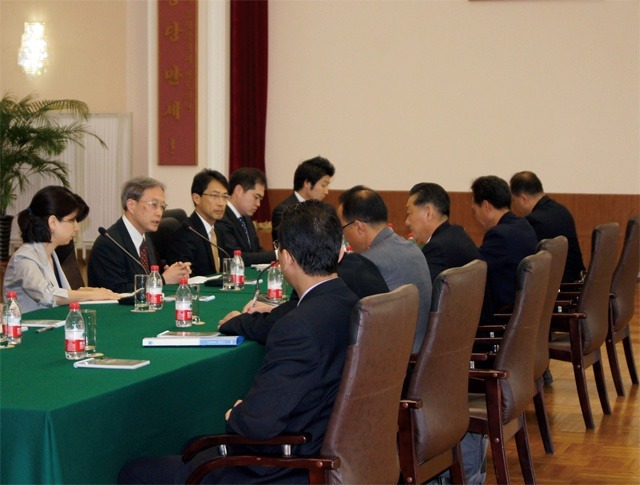
Japan-North Korea Intergovernmental Consultations (July 2014)
13. Japan-North Korea Diplomatic Authorities Meeting (September 2014 in Shenyang)
On September 29, 2014, a meeting between Japan-North Korea diplomatic authorities was held in Shenyang, China, for North Korea’s explanation on the current status of the investigations. North Korea said that it was not able to provide specific results on individual cases at this stage, but explained that, if a Japanese delegation visits Pyongyang and meet with the members of the Special Investigation Committee, they could hear a clearer explanation of the current status of the investigations.
14. Consultations with the Special Investigation Committee (October 2014 in Pyongyang)
In October 2014, Consultations with the Special Investigation Committee were held in Pyongyang, North Korea. Japan reiterated that the resolution of the abductions issue is the most important for Japan, ensuring security of all abductees and their immediate return to Japan, providing full account of the truth in all abduction cases and the extradition of perpetrators who conducted the abductions are indispensable, and Japan seeks to find out the whereabouts of abductees, whether or not officially identified as such by the Government, and to have them back safely to Japan as soon as possible. Japan also strongly urged North Korea to expeditiously conduct its investigations and report the results sincerely and swiftly to Japan.
North Korea provided an explanation of the organization such as the structure of the committee and its branches. It also explained its policy to conduct objective and scientific investigations with a focus on witnesses and physical evidence and to thoroughly deepen the investigations from new angles, regardless of the past investigation results. It also explained that the Committee is invested with special authority by the National Defense Commission, the highest guiding body of North Korea, to conduct a thorough investigation of all organizations, including special agencies. Regarding the abductions issue, North Korea said that it was investigating the specific cases, including whether or not abductees entered North Korea, their living circumstances and the details of how each case took place, and that a new investigation into related places including guest houses where the abductees had stayed was being carried out while looking for new physical evidence and witnesses.
15. Unilateral Announcement by North Korea of Dissolution of the Special Investigation Committee (February 2016)
In response to North Korea’s January 2016 nuclear test and the launching of a ballistic missile purported to be a “man-made satellite” in February, that same month Japan announced it would implement autonomous measures against North Korea. In turn, North Korea unilaterally announced that it would completely cease comprehensive investigations concerning any and all Japanese persons, including abductees, and dissolve the Special Investigation Committee. Japan firmly protested these actions by North Korea and conveyed its position that it would not abandon the Stockholm Agreement. Japan also demanded that North Korea return abductees as soon as possible based on the Agreement.
16. Subsequent Developments
Japan has repeatedly conveyed its basic position to North Korea since then. For example, at the reception of the opening ceremony of the Pyeongchang Olympic Winter Games hosted by then President Moon Jae-In of the ROK in February 2018, then Prime Minister Abe brought up the abductions, nuclear and missile issues, and conveyed Japan’s basic position to Kim Yong-Nam, then President of the Presidium of the Supreme People’s Assembly of North Korea. In particular, then Prime Minister Abe strongly urged North Korea to resolve the abductions issue, including the return of all abductees to Japan. In addition, based on the request from then Prime Minister Abe, then President Trump of the United States raised the abductions issue directly with Kim Jong-Un, Chairman of the State Affairs Commission, at the U.S.-North Korea Summit Meetings held in June 2018 and February 2019 (details to follow).
 3.Efforts in the International Community
3.Efforts in the International Community
In order to resolve the abductions issue, it is essential for Japan not only to proactively urge North Korea, but also to gain support and cooperation from other countries regarding the importance of resolving the abductions issue. Therefore, the GoJ has raised the issue at every diplomatic opportunity.
It is known that there are also many ROK people who were abducted by North Korea. Testimony from returned Japanese abductees and others has further revealed that there are people from Thailand, Romania, and Lebanon who may have been abducted by North Korea. It has also been said, according to the testimony from abductees of the ROK who have returned from North Korea and from others, that Chinese and other nationals have also been abducted.
As detailed above, abduction by North Korea constitutes a universal issue among the international community as a violation of fundamental human rights.
1. United Nations
(a) In the United Nations, the Resolutions on the Situation of Human Rights in the DPRK, which include reference to the abductions issue, have been adopted at the Human Rights Council 16 times for 16 consecutive years and at the General Assembly 19 times for 19 consecutive years (as of January 2024). The resolution adopted by the UN General Assembly in December 2023 stresses again with grave concern the urgency and importance of the issue of international abductions which involves a serious violation of human rights, and of the immediate return of all abductees, as they and their family members age, expresses grave concern at the long years of severe suffering experienced by abductees and their families, and the lack of any concrete or positive action by North Korea, notably since the investigations on all the Japanese nationals commenced on the basis of the government-level consultations held between Japan and North Korea in May 2014 and the identical and non-substantive replies by North Korea to the numerous communications transmitted by the Working Group on Enforced or Involuntary Disappearances, and strongly demands again that North Korea sincerely listen to the voices of the victims and their families to address all allegations of enforced disappearances, clarify the fate and whereabouts of disappeared persons and faithfully provide accurate, detailed and full information promptly to the families of the victims and resolve immediately all issues relating to all abductees, in particular the realization of the immediate return of all abductees of Japan and the ROK.
(b) At the Human Rights Council in March 2013, the Resolution on the Situation of Human Rights in the DPRK that includes the establishment of a Commission of Inquiry (COI) was adopted by consensus (without voting). The COI has investigated the human rights situation in North Korea including the abductions issue through their visits to Japan, the ROK, the U.S., the United Kingdom and Thailand, and has released their final report (COI report) in February 2014.
(c) In December 2014, the UN Security Council (UNSC) discussed the situation in North Korea comprehensively, including the human rights situation. Since then, the UNSC has held several meetings on “the situation in the DPRK.” Japan has urged the resolution of the North Korean abductions issue as soon as possible at these meetings. In December 2022, an informal consultation on the human rights situation in North Korea was held in the UNSC, and afterwards, like-minded countries including Japan issued a joint statement, which includes a sentence strongly urging the resolution of the abductions issue, and the immediate return of the abductees. In August 2023, a public meeting was held in the UNSC to discuss human rights situation in North Korea, including the abductions issue, for the first time in about six years since 2017. After the meeting, 52 Member States and others including several UNSC Members participated in the joint media stakeout by like-minded countries. They called on all UN Member States to hold North Korea accountable for its human rights violations, while addressing the abductions issue.
(d) In addition, the GoJ has sought to disseminate information and strengthen coordination with the international community, including hosting international symposiums at the UN Headquarters and other locations. In June 2023, an online symposium in the UN on the abductions issue was held as a side event of the UN, co-hosted by the governments of Japan, the U.S., Australia, the Republic of Korea, and the delegation of the European Union. In the symposium, the voices of parties concerned, including the Association of the Families of Victims Kidnapped by North Korea, and the Family Association of the Missing Persons Probably Related to the DPRK, were conveyed to the international community, and a panel discussion was held by a former Ambassador to North Korea of the UK and former Ambassador of international cooperation on North Korean human rights of the Republic of Korea. In this way, the symposium called for the understanding and cooperation of the international community towards the immediate resolution of the abductions issue.
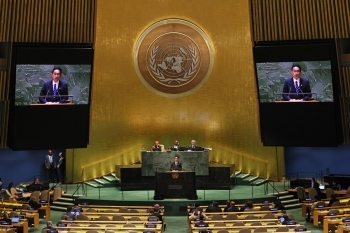
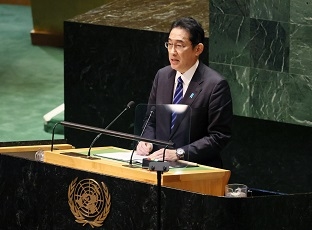
Prime Minister Kishida during his speech at the General Debate Session in the UN General Assembly (September 2023)
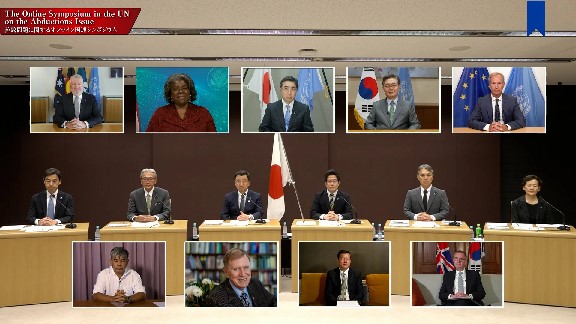
The online symposium in the UN on the abductions issue (June 2023)
Speakers of the Association of the Families of Victims Kidnapped by North Korea
and the Family Association of the Missing Persons Probably Related to the DPRK at the symposium. (middle row, right)
2. Six-Party Talks
Japan has raised the abductions issue at the Six Party Talks. In fact, taking steps to normalize relations between Japan and North Korea, on the basis of the settlement of the abductions issues and other outstanding issues of concern, was set as one of the goals in the September 2005 Joint Statement of the Six-Party Talks. Based on this goal, during the Six-Party Talks held in February 2007, the decision for the establishment of a Working Group for the “Normalization of DPRK-Japan Relations” was incorporated in an outcome document. At the Six- Party Talks held in October 2007, it was reaffirmed in another outcome document that “the DPRK and Japan will make a sincere effort to normalize relations expeditiously in accordance with the Pyongyang Declaration, on the basis of the settlement of ‘the unfortunate past’ and the outstanding issues of concern,” and that “the DPRK and Japan have committed themselves to taking specific actions towards this end through intensive consultations between them.” The abductions issue is no doubt included in the “outstanding issues of concern.”
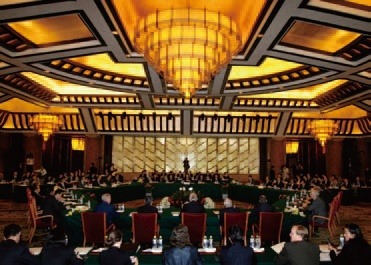
Six-Party Talks (September 2007)
3.Multilateral Frameworks
The GoJ has raised the abductions issue in multilateral frameworks, including the G7 summit, the Japan-Australia-India-U.S. Summit Meetings and the ASEAN-related Summit Meetings, and the importance of resolving the abductions issue and efforts the GoJ has been making towards this end have gained the clear understanding and support of other nations.
At the G7 Hiroshima Summit in May 2023, the G7 leaders reaffirmed that they would continue to closely work together in responding to issues related to North Korea, including the abductions issue, and also stated in the Leaders' Communique that the G7 would call for an immediate resolution of the abductions issue.
At the Japan-Australia-India-U.S.(Quad) Leaders’ Meeting, held on the occasion of the G7 Hiroshima Summit, Prime Minister Kishida also asked for the understanding and cooperation of each country toward the immediate resolution of the abductions issue, and gained their support. In Quad leaders’ Joint Statement, it is stated that the four leaders urged North Korea to resolve the abductions issue immediately.
At the Japan-U.S.-ROK Summit held in August 2023 at Camp David in the United States, the leaders reaffirmed their shared commitment to the immediate resolution of the abductions issue.
At the ASEAN Japan Summit held in September 2023, Prime Minister Kishida asked for continued understanding and cooperation of each country toward the immediate resolution of the abductions issue through a series of meetings and other means, and a reference to an immediate resolution of the abductions issue was included in the Chairman's Statement. At the Commemorative Summit for the 50th Year of ASEAN-Japan Friendship and Cooperation in December 2023, Prime Minister Kishida also asked for understanding and cooperation from all countries toward an immediate resolution of the abductions issue through a series of meetings.
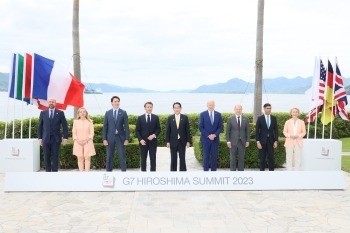
G7Hiroshima Summit(May 2023)
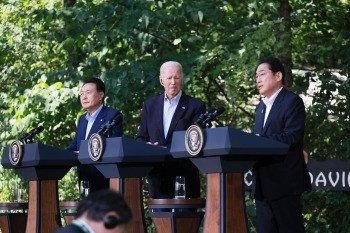
Japan-U.S.-Korea Summit(August 2023)
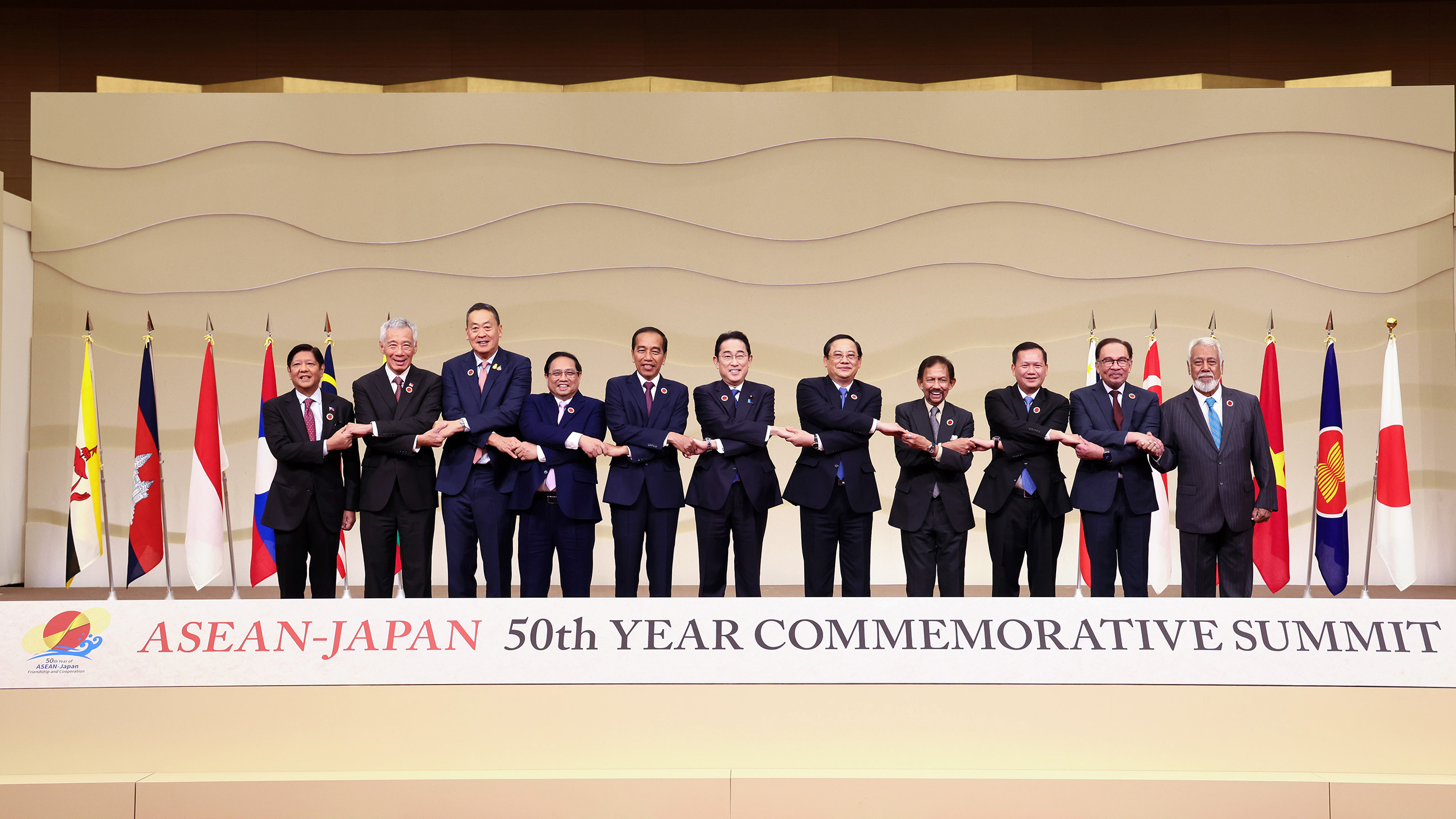
The Commemorative Summit for the 50th Year of ASEAN-Japan
Friendship and Cooperation(December 2023)
4. Bilateral Consultations
The GoJ has addressed the abductions issue at bilateral summit talks and foreign ministerial meetings with countries such as the United States, the ROK and China, who offer their understanding and support for the position of Japan.
For example, with regard to the United States, based on a request from then Prime Minister Abe, then President Trump took up the abductions issue with Kim Jong-Un, Chairman of the State Affairs Commission, at the first U.S.-North Korea Summit Meeting in June 2018. In addition, at the second U.S. North Korea Summit Meeting in February 2019, then President Trump raised the abductions issue with Chairman Kim Jong-Un during the first tete-a-tete meeting held on the first day, and clearly conveyed then Prime Minister Abe’s views regarding the abductions issue to the Chairman. At the small group dinner that followed, then President Trump once again raised the abductions issue, and a serious discussion took place between the leaders.
After assuming office in September 2021, Prime Minister Kishida asked for continued understanding and cooperation towards the immediate resolution of the abductions issue, to which President Biden offered his support at the Japan-U.S. Summit Telephone Talk in October Subsequently, at the Japan-US Summit Meeting in January, May, October, November 2022, January and May 2023, Prime Minister Kishida asked for the continued understanding and cooperation of the United States for the immediate resolution of the abductions issue, and again gained full support from President Biden. Furthermore, in the Japan-U.S. Joint Statement issued on the occasion of the January 2023 Summit Meeting, President Biden reaffirmed the U.S. commitment to the immediate resolution of the abductions issue. Furthermore, during his visit to Japan in May 2022, President Biden met with the family members of the abductees in the presence of Prime Minister Kishida, and listened carefully and earnestly to the families’ sentiment and their requests for U.S. support in resolving the abductions issue as soon as possible. At the joint press conference following the Japan-U. S.-ROK Summit in August 2023, President Biden mentioned his meeting with the family members of the abductees and expressed his determination to work together to see the return of all the abductees.
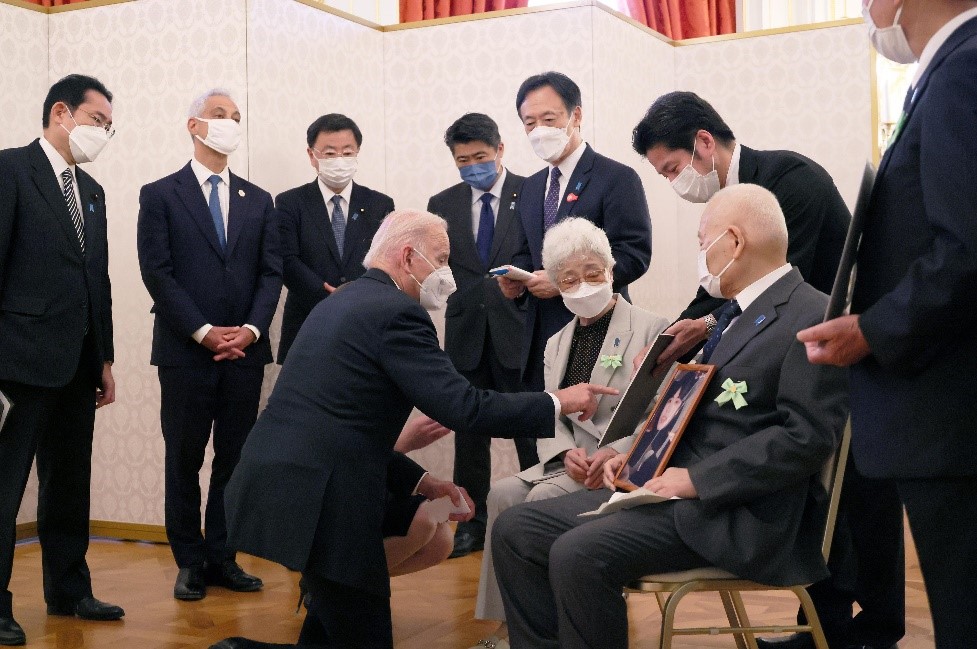
Meeting between President Biden and the family members of the abductees
(May 2022)
As for the ROK, Prime Minister Kishida asked for continued understanding and cooperation in resolving the abductions issue at the Japan-ROK Summit in March, September, October and November 2022, March and May 2023, and again gained support from President Yun Suk-yeol. The two countries also concurred that they would work with each other in dealing with North Korea, including the abductions issue, at the Japan-ROK Summit in July and November 2023.
Regarding China, at the Japan-China Summit Meeting in June 2019, President Xi Jinping stated that, during China-North Korea Summit held in June, he conveyed to Chairman Kim Jong-Un Japan's position on Japan-North Korea relations and Prime Minister Abe's views also gained the strong support of President Xi for improvement of Japan-North Korea relations, including the abductions issue. At the Japan-China Summit Meeting on November 16, 2023 the two leaders also discussed the international affaires, such as North Korea, including the abductions issue, and confirmed that they would maintain close communication on those issues.
Draft Resolution Concerning a U.S. Citizen Possibly Abducted by North Korea
In the U.S. Congress, a draft resolution, which urged the U.S. Government to coordinate investigations with the governments of Japan, China, and the ROK on a U.S. citizen possibly abducted by North Korea, was approved and passed in the regular session of the House of Representatives in September 2016. In addition, an identical draft resolution was approved and passed in the regular session of the Senate in November 2018.
 4.Steps Taken in Japan
4.Steps Taken in Japan
1. Establishment of the “Headquarters for the Abduction Issue”
In January 2013, the GoJ established a new “Headquarters for the Abduction Issue” consisting of all Ministers of State, in order to discuss measures to address the abductions issue and to promote strategic approaches and comprehensive measures for the resolution of this issue. The Headquarters is led by the Prime Minister serving as the head, and the Minister in Charge of the Abduction Issue, the Chief Cabinet Secretary, and the Minister for Foreign Affairs serve as the deputies. Individual Ministers closely collaborate with mainly the head and deputies and exert themselves to the utmost of their ability in their respective fields of responsibility towards the goal of resolving the abductions issue.
Moreover, the “Liaison Council of Government and Ruling and Opposition Parties Institutions for Measures against Abduction Issue” has been formed to strengthen bipartisan efforts towards the resolution of the abductions issue.
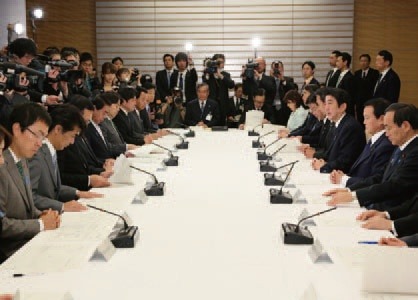
The First Meeting of the Headquarters for the Abduction
Issue (January 2013)
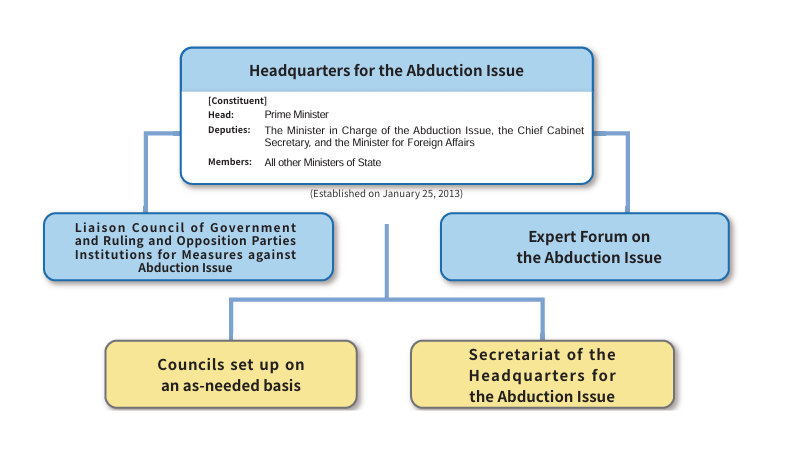
Policies and Concrete Measures for Resolving the Abduction Issue![]()
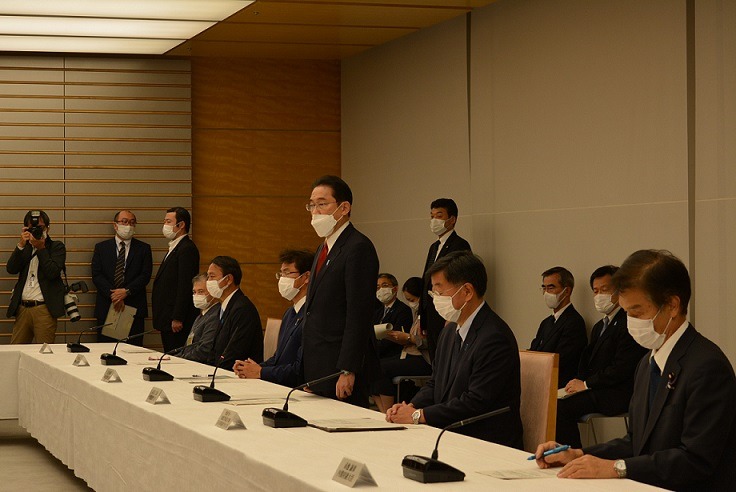
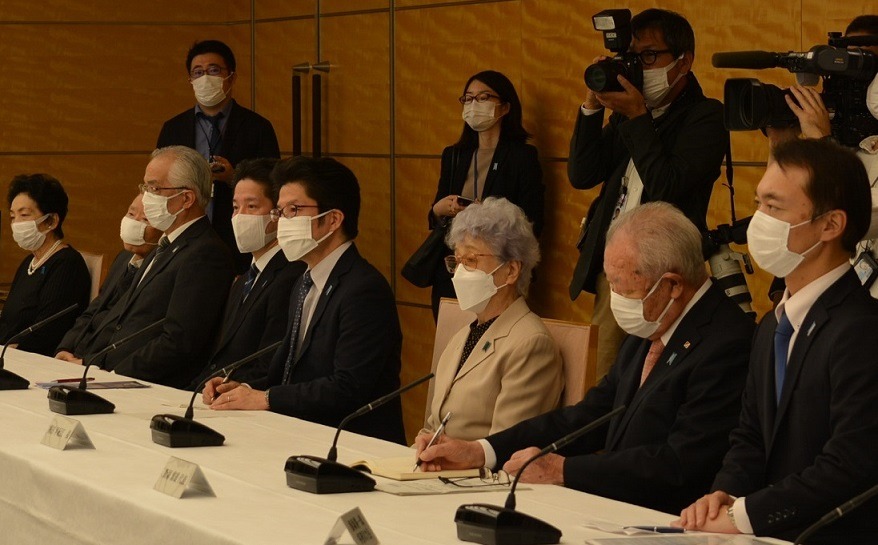
Meeting between Prime Minister Kishida and Family Members of the Abductees
(October 2021)
2. Investigations by the GoJ
The GoJ, with the continuous cooperation from the returned abductees, has been thoroughly investigating the cases of abduction by North Korea as well as the cases of disappearances in which the possibility of abduction by North Korea cannot be ruled out. As a result of such investigations, the GoJ has so far identified 12 separate incidents involving a total of 17 Japanese citizens abducted by North Korea.
The National Police Agency of Japan determined that a case in which an elder sister and younger brother of Korean domicile were abducted from Japan (two abductees) is also a suspected abduction case committed by North Korea. It has issued domestic arrest warrants for 11 suspects including North Korean agents, who were involved in abduction cases, and then also issued for them international arrest warrants.
Furthermore, regarding the investigations into the disappearances in which the possibility of abduction by North Korea cannot be ruled out, Japanese authorities have been striving to reveal the truth behind these cases by reinforcing their efforts, including 1) the installation of a Special Supervision Team in the Foreign Affairs Division of the National Police Agency in March 2013 to conduct supervision and coordination between prefectural police departments, 2) the collection of physical evidence from family members for DNA testing, and 3) the posting of information on the websites of the National Police Agency and prefectural police departments, including a list of the people who are involved in the cases in which the possibility of abduction by North Korea cannot be ruled out in their disappearances. In addition, by enhancing their partnership, the Police and Japan Coast Guard have been collectively reinvestigating cases that were originally handled as marine accidents.
■ Interpol Notice Suspects Connected with Suspected Abduction Incidents
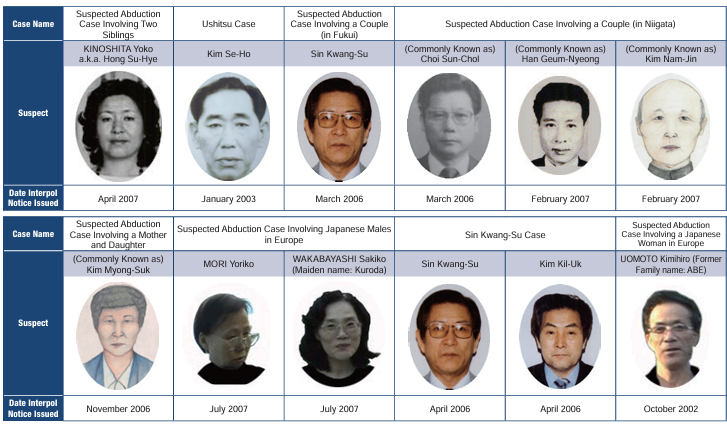
3. Efforts to deal with cases in which the possibility of abduction by North Korea cannot be ruled out
With the recognition that, in addition to Japanese citizens already identified as having been abducted by North
Korea pursuant to Article 2 of the Act on Support for Victims Abducted by North Korea (hereinafter referred to as the
“Support Act”), there are other cases in which the possibility of abduction by North Korea cannot be ruled out, the GoJ
has been conducting information gathering and investigation activities both in Japan and overseas while maintaining
close cooperation among the relevant ministries, and agencies in every possible effort to solve the matter. As a result
of that, when the GoJ confirmed that further abductions were committed by North Korea, the abductees will be
promptly identified as victims as stipulated in the Support Act.
The GoJ has repeatedly demanded that North Korea ensure the safety and immediate return of all abductees, not
only those who have been identified so far.
(Note) Act on Support for Victims Abducted by North Korea (Extract)
(Definitions)
Article 2: In this Act, the meanings of the terms listed in the following
items are as prescribed respectively in those items (i) “Victim” means
a person identified by the Prime Minister as a Japanese citizen abducted
by North Korea. (ii) to (vii) (…)
2 When the Prime Minister intends to make an identification set forth
in item (i) of the preceding paragraph, he/she shall consult with the
heads of the relevant administrative organs in advance.
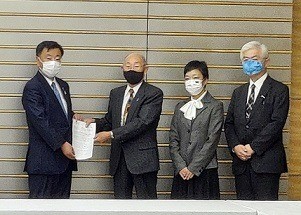
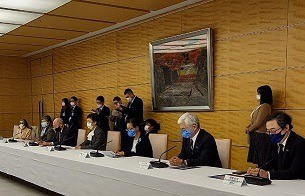
Meeting between Mr.Matsuno, then Chief Cabinet Secretary and Minister in charge of the Abduction Issue,
and the Family Association of the Missing Persons Probably Related to the DPRK and others(November 2022)
4. Major Activities to Publicize and Promote the Understanding of the Abductions Issue
The Law to Address the Abductions Issue and Other North Korean Human Rights Violations was promulgated and
came into effect in June 2006 with the purpose of increasing awareness among Japanese nationals of the abductions
issue and other human rights violations committed by North Korean authorities. In cooperation with the international
community, the law also aims to elicit a full account of the situation surrounding the abductions issue and to prevent
abductions from happening again in the future. In addition to laying out the responsibilities of the GoJ in resolving the
abductions issue, this law holds national and local
governments responsible for raising awareness of the
issue and to this end establishes North Korean Human
Rights Abuses Awareness Week (December 10 - 16),
which calls on national and local governments to hold
educational events on the topic during this week.
The GoJ also distributes pamphlets and posters,
screens movies and cartoons which raise awareness
about the abductions issue, dispatches personnel for
workshops and other educational events, hosts essay
contests for junior high and high school students, holds
training for teachers, university students aspiring to
become teachers and others, broadcasts radio
programs (in Japanese and Korean) to North Korea and
holds arts performances aimed at raising awareness of
the issue, etc. In August 2023, the “Junior High School
Summit on Abductions by North Korea” was held, where
junior high school students nominated by prefectural and
government-designated city boards of education from
across Japan gathered in Tokyo to learn about and
discuss the abductions issue.
Furthermore, every year in December, during North
Korean Human Rights Abuses Awareness Week, many
conferences and symposiums etc. are held by
governments and NGOs to advocate the resolution of
the abductions issue both inside and outside of Japan.
In particular, the GoJ has been working to raise
awareness of the abductions issue through symposiums
hosted by the GoJ and other opportunities to hear the
“real voices” of those concerned, including members of
the Association of the Families of Victims kidnapped by
North Korea and the Family Association of the Missing
Persons Probably Related to the DPRK.
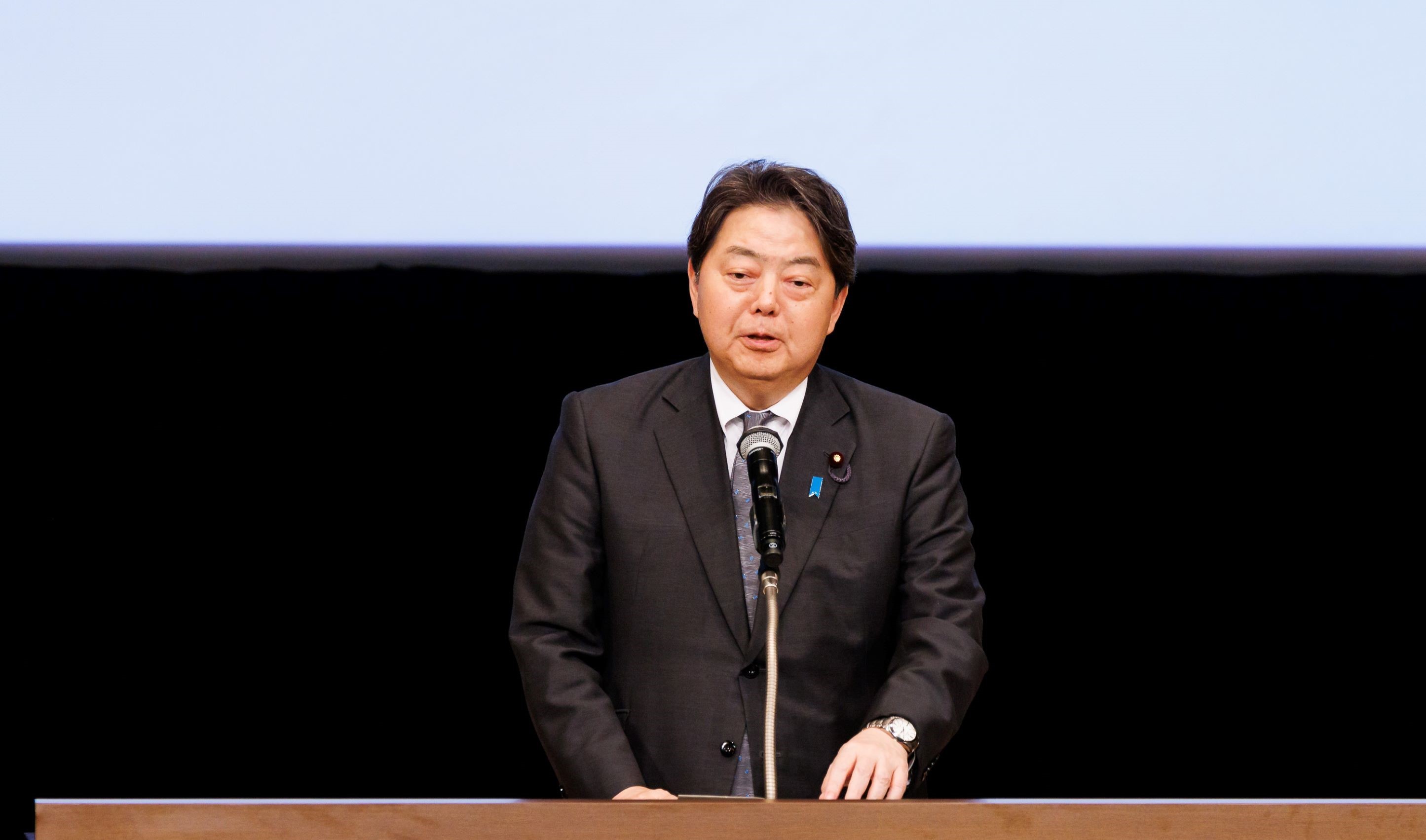
Mr. Hayashi, Chief Cabinet Secretary and Minister in Charge of the
Abduction Issue during the keynote speech
at the symposium on the abductions issue (December 2023)
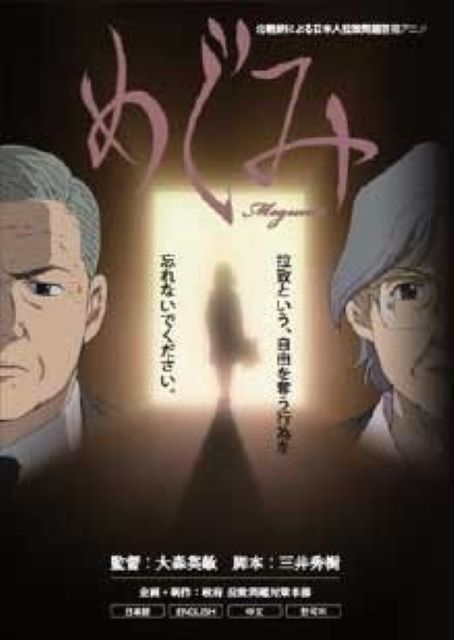

MEGUMI(Japanese animation) Posters distributed nationwide
5.Actions against North Korea
On July 5, 2006, North Korea launched seven ballistic missiles. Since then, despite repeated warnings from the international community, Pyongyang again launched ballistic missiles in April 2009, April 2012 and December 2012. It also carried out nuclear tests in October 2006, May 2009 and February 2013. In addition, in March 2010, North Korea launched a torpedo attack on an ROK naval vessel. In response, the GoJ protested firmly, expressing strong condemnation of these North Korean actions, and imposed a series of measures against North Korea. In addition to the sanction measures set out in the UNSC resolutions, Japan requested its own citizens to refrain from traveling to North Korea, banned the entry of North Korean nationals into Japan as well as of North Korean flagged ships and ships that have made port calls in North Korea into Japanese ports and also, prohibited export and import with North Korea.
Based on what was agreed in May 2014, that July Japan lifted restrictions on visits of persons, special measures of restriction on North Korea regarding the amount of money requiring notification of the export of means of payments and report on the money transfer, and the embargo on the entry of North Korea flagged ships with humanitarian purpose into Japanese ports.
However, in response to North Korea’s January 2016 nuclear test and February ballistic missile launch, in February that same year, Japan implemented restrictions on visits of persons; lowered the minimum amount of money requiring notification of the export of means of payment; prohibited in principle the payment of money to North Korea; prohibited the entry of North Korean flagged ships as well as ships carrying the flag of a third country which stopped at a port in North Korea, including those with humanitarian purposes, into Japanese ports; and also expanded the list of related organizations and individuals subject to asset freezing. In addition, Japan also implemented measures against North Korea based on UNSC resolution 2270 adopted in March of that year, including prohibiting the entry into Japanese ports of ships designated as subject to sanction and expanding the list of related organizations and individuals subject to asset freeze.
Furthermore, in September 2016, North Korea conducted the second nuclear test in the year. It also launched over 20 ballistic missiles that year. Taking into account that it failed to resolve the abductions issue in spite of strong calls to return all abductees as soon as possible, Japan upgraded restrictions on travel to North Korea, prohibited the entry into Japanese ports of Japanese flagged vessels which had stopped at a port in North Korea, and further expanded the list of related organizations and individuals subject to asset freeze in December of that year. Additionally, based on the UNSC resolution 2321 adopted in November that same year, Japan again further expanded the list of related organizations and individuals subject to asset freeze.
Moreover, in 2017, North Korea launched 17 ballistic missiles, including three with an intercontinental ballistic missile (ICBM) range, and in September of the same year, North Korea carried out the sixth nuclear test, the scale of which is estimated to be the largest in its history. Meanwhile, UNSC adopted resolutions 2356, 2371, 2375 and 2397 in June, August, September and December of the same year respectively, and Japan expanded the list of related organizations and individuals subject to asset freeze based on those resolutions. In addition, Japan implemented autonomous measures in July, August, November and December of the same year, designating additional entities and individuals subject to asset freeze. Furthermore, in 2022, North Korea launched ballistic missiles 31 times with unprecedented frequency and manner, including those passing over Japan and multiple ICBM-class ballistic missiles, and in 2023, it repeatedly launched ballistic missiles and others. Under these circumstances, the GoJ designated additionally as Japan's own autonomous measures, related organizations and individuals as subject to such measures as asset freeze in April, October, and December 2022, and March, September, and December 2023.

adobe readerダウンロード
PDF形式のファイルはadobe readerが必要です。








